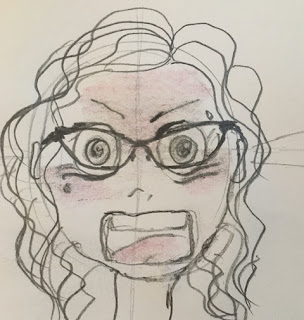The Answer is Purple: Maria Gacesa in Conversation
Maria Gacesa chatted with me about her creative practice and her poem “Aria on the 3:50 to St-Lambert.”
SUSAN GILLIS: How did you find your way to poetry--or it to you?
MARIA GACESA: Ms Mitchell had a copy of Where the Sidewalk Ends in my grade 3 classroom, so Shel Silverstein very likely had something to do with it. Also, English is not my parents’ mother tongue (though it is mine), so issues around language and word play were a big part of growing up, as was letter writing—I had several long-term pen pals.
Poetry, specifically, is attractive to me because I think it allows access to an expressive mode most similar to dance and music, both of which play into my practice in life and art. Practising life! Yes!
SG: Music “revisits things”, the poem says, and then shows a series of likenesses, both heard and seen, that music seems to be giving shape to, at least in part. I’m curious: when you’re out in the world, does the environment shape the music you’re listening to on a device, if you are doing that? Or maybe the other way around, does the music you’re listening to shape the environment?
MG: Trying to answer this question is a bit like taking that right-brain / left-brain test that asks whether you see the horse walking backwards or forwards. Strange as it is, the answer is purple. I don’t generally listen to anything while I’m walking, but will occasionally listen to music when I find myself on public transit, like I was when I wrote Aria. The music and environment combine into something new, then remain alloyed in my memory.
SG: What’s currently on your am-reading/am-listening list?
MG: I’m hooked on the CBC PlayME podcast. The audio plays are superbly produced—truly "bingeable audio dramas,” just as advertised, and there are SO many.
For the last year I’ve been listening to Ann Southam’s Rivers sets for solo piano on repeat. Its effect on me is grounding; their basic matter must have become as intrinsic to Southam as her own DNA, such was her commitment to this masterwork of endless, painstaking creativity. Infinity in confined spaces, indeed.
Lastly, it must be spring because I’ve also been happily immersed in the gorgeous sensory world of Pluviophile by Yusuf Saadi.
__
Maria Gacesa is a writer and classical musician. Her poetry has appeared in The Lyric Magazine and her one-act play, “MOTH," was a prizewinner in the 2021 Norma Epstein Foundation for Creative Writing Awards. She works in arts advocacy and education at The Préville Fine Arts Centre, on Montreal’s South shore. Read "Aria on the 3:50 to St-Lambert" here.
 |
| Self-portrait by Maria Gacesa |